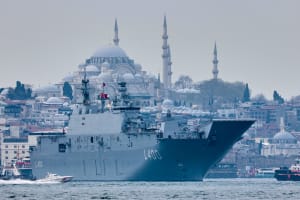IDF denies claims that Israeli troops advanced to Damascus outskirts amid criticism of Golan ‘buffer zone’
UN criticizes while Qatar, Saudi Arabia, Turkey & Iran slam Israeli ‘land grab’ in Syria

Israel Defense Forces denied multiple reports on Tuesday, claiming Israeli troops had advanced to within just over 20 kilometers (more than 12 miles) of the Syrian capital of Damascus after numerous countries in the region sharply criticized the Israeli capture of the demilitarized zone (DMZ) situated between Israel and Syria.
“Reports that are circulating in some media outlets, claiming that IDF forces are advancing or approaching Damascus, are completely incorrect,” said IDF Arabic Spokesman Col. Avichay Adraee.
“IDF forces are present inside the buffer zone and at defensive points close to the border in order to protect the Israeli border,” he added.
On Monday, the Israeli army took up forward positions within the demilitarized zone along the Israeli border with Syria on the Golan Heights, after the Syrian Armed Forces abandoned its posts following the collapse of the Assad regime.
Israel has conquered Mt. Hermon, the highest mountain in Syria, its peak reaching 2,814m. Syria’s capital, Damascus, is only 40 km away, now within range of Israel’s artillery shells. Here’s why Israel took this mountain:
— Naftali Hazony (@nhazony) December 9, 2024
1/7 🧵 pic.twitter.com/XZdjeeU9RD
In addition to reports from the Hezbollah-affiliated news site al-Mayadeen, Reuters cited “two regional security sources and one Syrian security source” who claimed that IDF troops reached Qatana, a town on the foothills of the Syrian Hermon, just 15 kilometers (less than 10 miles) from Damascus.
The Turkish Foreign Ministry strongly condemned Israel’s capture of the DMZ, saying “Israel is once again displaying its occupation mentality.”
In addition to criticism from hostile nations such as Iran, Iraq, and Qatar, the Kingdom of Saudi Arabia, which reportedly remains interested in pursuing a peace deal with Israel, also condemned Israel's seizure of the demilitarized zone (DMZ). The Saudi foreign ministry stated that the action reflects Israel's intent to "ruin Syria’s chance of restoring its security.”
Qatar dubbed the move “a dangerous development and a blatant attack on Syria’s sovereignty and unity as well as a flagrant violation of international law.”
While visiting a viewpoint overlooking Syria on Sunday, Israel’s Prime Minister Benjamin Netanyahu said the capture of the buffer zone was necessary as a “temporary defensive position.”
Initially, Israel significantly reinforced its IDF deployments in the Golan in response to the rapid advance of rebel forces in northern Syria last week. On Friday, rebel groups across southern Syria also launched uprisings against the regime of Syrian President Bashar al-Assad.
The next day, the IDF reported that it had assisted UN peacekeeping forces after a post belonging to the United Nations Disengagement Observer Force (UNDOF) came under attack, and later announced it was taking control of the buffer zone.
UNDOF is a peacekeeping mission tasked with maintaining the ceasefire between Israel and Syria in the aftermath of the 1973 Yom Kippur War.
This Israeli account was confirmed on Saturday by UN spokesman Stéphane Dujarric: “Armed individuals climbed the wall of a U.N. position near Hader."
“Following an exchange of fire with U.N. peacekeepers who were protecting the position, the base was partially looted. There were no casualties.” Dujarric said UN forces later recovered some of the weapons and ammunition that were stolen.
Despite Israeli forces helping the UNDOF troops, Dujarric joined in the condemnation of Israel.
“The peacekeepers at UNDOF informed the Israeli counterparts that these actions would constitute a violation of the 1974 disengagement agreement, that there should be no military forces or activities in the area of separation,” Dujarric said.
Russia called a special meeting of the UN Security Council later this week to discuss the buffer zone issue.
An Israeli military official told the Associated Press that Israel sees the move as “a temporary step to make sure stability is kept in the border, making sure the buffer zone is kept, and the U.N. forces can stay.”
He explained that part of Israel’s rationale was to prevent the recurrence of an incident in 2014, when UNDOF troops fled the buffer zone amid an al-Qaeda-led attack on their posts.
“I would like to say to the generations of our fighters who laid down their lives to liberate and defend the Golan Heights, and I say to the generations of residents who put down roots on the Golan Heights: Today, we all understand the great importance our presence there – on the Golan Heights, and not at the base of the Golan Heights,” Netanyahu said in a press briefing on Monday.
“Our control on the Golan Heights ensures our security; it ensures our sovereignty. I would like to take this opportunity to thank my friend, President-elect Donald Trump for acceding to my request to recognize Israel's sovereignty over the Golan Heights, in 2019. The importance of this historic recognition has been underscored today,” he added.
“The Golan Heights will be an inseparable part of the State of Israel forever.”

The All Israel News Staff is a team of journalists in Israel.













